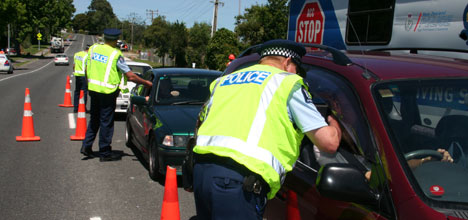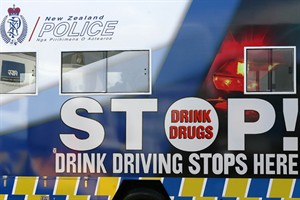One evening a little while ago I was driving home and encountered a Police ‘booze bus’ breath-test checkpoint.
Cars queued up in a funnel pattern set up with cones and flashing lights … when it was my turn, the police officer reached in through my car window, held the breath screening thingy in front of my face and said:
“Please say your name and address.”
I replied (into the machine) “You don’t really want my name and address, you just need enough breath for a sample.”
This was not well received.
“Look here. It’s the law that when a police officer asks for your name and address, you must supply them,” he said sternly and scanned the display of the breathalyser.
“Well yes,” I said. “That’s if the question is being asked as part of an inquiry. Not just when you need some breath for a blood alcohol screening device.”
He looked at me hard.
He looked at my car and who else was in it.
He looked again at the reading on the breath-testing thingy.
Then he frowned at the queue of cars building up behind me, thought about it, and waved me on without another word.
I was reminded of that episode by a blog post I Am Detained By The Feds For Not Answering Questions from Paul Karl Lukacs about his experience refusing to answer questions at a US Customs and Border Patrol…
“Why were you in China?” asked the passport control officer, a woman with the appearance and disposition of a prison matron.
“None of your business,” I said.
Her eyes widened in disbelief.
“Excuse me?” she asked.
“I’m not going to be interrogated as a pre-condition of re-entering my own country,” I said.
This did not go over well. She asked a series of questions, such as how long I had been in China, whether I was there on personal business or commercial business, etc. I stood silently. She said that her questions were mandated by Congress and that I should complain to Congress instead of refusing to cooperate with her. …
Paul’s post, and his follow-up 10 Brief Responses To 700 Comments About Refusing To Answer Questions At Passport Control are well worth a read in their entirety.
—
Now, look, I’m all for getting drunk drivers off the road, and if these ‘booze bus’ checkpoint campaigns work, GREAT. I’ll also be the first to concede that maybe Paul and I were being pedantic and uncooperative — even oppositional. But haven’t we each got a point?
Paul: the U.S. government does not have the power to prevent a citizen’s re-entry. You have the right to remain silent.
Me: A person in NZ must tell a police officer their name and address if asked — but only if there’s an actual purpose in the question.
Any thoughts?




That’s very, very scary – I always thought they just asked you name/addy because most people know the answers to those questions! I will try your answer the next time I’m stopped – so long as I haven’t been drinking!
Hi Lissie,
Yes I think you’re right — they just ask a simple question which prompts enough of an answer (in most cases) to give them a sample of breath to scan. (Another option would be to ask people to count to ten … )
Sure I was a bit stroppy, I admit it. I hadn’t been drinking, my car was registered and had a current Warrant of Fitness … and I had my seatbelt on. — All of which gave me the confidence to try it.
Cheers, – P
Last October, returning from a bog-standard family holiday in Rarotonga my husband and I were grilled by NZ Immigration over our employment and asked exactly what we did, our company names, what job titles we gave ourselves.
I wish now I’d asked “How do these questions affect our right to reentry?”
Q: “How do these questions affect our right to re-entry?”
Yes, it’s a good one to consider, isn’t? Often we’re so intimidated we comply to what we imagine is authority.
Not to trump your story in any way, but you remind me of my most memorable encounter on re-entering NZ … when a drugs sniffer dog handler asked me to conceal a small packet (on my person) to see if his dog would catch me!
My first two responses: ‘Can I see some ID?’ and ‘What on earth made you pick me?’
… followed by -‘What’s actually in the packet?’ (barbiturates with a similar aroma ‘signature’ to hard drugs, he told me) and vitally: ‘What will the dog do to me when it finds the packet?’
It worked out OK. I didn’t make it easy for the dog, walking quietly away every time it came near me in the baggage claim area … but it got me all right. Both dog and trainer were very happy — my wife and kids, who were travelling with me, thought it was a huge laugh. – P
PS I wouldn’t have done that anywhere but New Zealand, even with my clear conscience!
I am the first one to question whether the authorities are ‘going to far’
But I think the examples you have just discussed are harmless at worst.
You are correct, they just want a breath sample. But come on what can they ask that everyone has and knows that can give a good sample that makes the process fast. Also by asking your name puts you on the back foot. Counting does not give good sample because you can control your speech easier with no syllables. Asking questions at checkpoints at airports are required even if you are returning, Home. When a criminal gets through these checkpoints. Checkpoints are the first place people point the finger pointed at for not doing their job. However for me its when these Customs people have an attitude turns agro and nasty for no reason that’s just rude.
I think readers here may like a podcast I listen too it puts a interesting slant on the Media. “Ïn the Morning”
http://www.noagendashow.com
Cheers, Craig. Welcome along.
Yes I agree the ATTITUDE of the authority figure in question makes a huge impact.
And yes, a ‘standard’ question has its place — but to get hissy with me (and cite ‘the law says’) because I didn’t comply … well, just silly. Obedience is habit-forming — to both sides of the social transaction.
Paul Lukacs’ description “a woman with the appearance and disposition of a prison matron” may have been a bit tough, but I can see her, and perceive her um, customer relations approach, can’t you?
The reason I was willing to go out of my way to help the Customs sniffer dog handler was because he made a request, not a demand. (And I like to say ‘yes’ to new experiences. Within reason.)
– P
Thanks Peter,
I agree mostly, I see this time and time again where the public feels they are the victim because a authority figure gets hissy. This often is mainly because the person was snappy/defensive from the outset. Causing the tension.
What I am saying is the public sometimes feel they have or deserve all the rights, when this is not the case.
But I agree Authorities a lot of the time need to calm the **** down.
An example here may have been rather than simply, stating why you thought he wanted you to state Name and Address for a breath test, if you had asked, “Do you mind if I just say something else, and why is it we need to state Name and Address” the officer may well have said no, but their hissy fit may well have been toned down.
I am not coming from the angle of bowing down to Authority, I think in general our rights are being slowly eroded, especially privacy. But often on these occasions these fracas start on the other side of the fence.
Also two wrongs do not make it right.
Craig: Sure, but when a citizen deals with ‘authority’ it’s not an even playing field, is it? – P
Lord Acton’s dictum:
http://en.wikipedia.org/wiki/John_Dalberg-Acton,_1st_Baron_Acton
[…] I have met online, corresponded and exchanged discussion with and who [very] occasionally comments here on thePaepae.com Lissie Sowerbutts was mentioned in despatches by the fake robot. […]